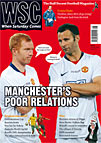 There is a section of Italy that it using football as a way of campaigning for independence. Matthew Barker tells all
There is a section of Italy that it using football as a way of campaigning for independence. Matthew Barker tells all
Last month’s European and local elections saw the Lega Nord increase its support base beyond the traditional heartland of the Veneto and Lombardy in the north-east of Italy, reaching as far down as Emilia Romagna and the northern edges of Tuscany. The Lega, seeking to break away from the national government in Rome and the Mezzogiorno south, forms a strong coalition with Silvio Berlusconi’s ruling People of Freedom party, and has been steadily winning over disgruntled voters with far-right policies based exclusively around twin obsessions of immigration and security.
On the day that crucial city mayoral election results came in, Lega leader Umberto Bossi snubbed his usual weekly Monday night dinner with the Italian prime minister, telling bemused reporters: “I’m going to watch the Padania national team play. It’s more important than Berlusconi. I’ll see him tomorrow.” Bossi was referring to the opening game of the Viva World Cup, an annual tournament, now in its third year, organised by the New Football Federation Board (NF). Created in 2003, with headquarters in Liège (Luc Misson, Jean-Marc Bosman’s lawyer, was among its founders), the NF promotes the claims of regions and island states that aren’t officially recognised by FIFA. Among its 30 members are Tibet, Northern Cyprus, the Principality of Monaco and Zanzibar.
These are all places that actually exist; that you can find in your atlas. Padania, despite a few dubious claims to (ancient) historical precedent, doesn’t. It remains very much a political ideal. The football team is a way of promoting the Lega – and its claims to “Padania” – as a dynamic, sympathetic cause, with all the right-on cachet of Tibet and Catalonia, rather than a dodgy political doctrine; this, after all, is the party that recently attempted to introduce a law decreeing that seats on Milan’s transport system (always at a premium) should be reserved strictly for born-and-bred Milanesi.
The five-day tournament featured just six teams, split into two groups – Padania, Kurdistan and Occitania in one, with Lapland, Provence and Gozo (Malta) in the other – and the games held in stadia in Verona, Brescia, Novara and Varese. Padania, as the current trophy holders, began as favourites.
Former Milan and Inter striker Maurizio Ganz combined a coaching role with playing up front, with Bossi’s Milan-supporting son and successor Renzo as team manager (one member of the squad, Lorenzo Cresta, plays in the Ivory Coast for the Africa Sport club, coached by a fellow proud Padania citizen, Gianni Bortoletto). The biancoverdi, in green-and-white hoops, beat Kurdistan and Occitania on their way to the final, played at Verona’s Stadio Marcantonio Bentegodi (there had initially been hopes that the Giuseppe Meazza in Milan would be used).
Kurdistan again provided the opposition in the final, won 2-0 by Padania. A short, cursory paragraph in the following day’s Gazzetta dello Sport reported on the victory, accompanied by a photograph of a delighted Bossi mugging away for the camera with the celebrating team. The games have had little or no coverage in Italy’s sporting press, though La Padania, the Lega’s newspaper, naturally enough treated it all like a major international event (current Sampdoria boss Luigi Del Neri used to write a column for the paper, which did little to endear him to the locals during his brief stint in charge at Roma) and the final was shown live on one of state broadcaster RAI’s cable channels. Equally, attendance figures have been a serious disappointment this year, with just 850 loyal flag-waving leghisti turning up at Brescia’s Stadio Mario Rigamonti (capacity 27,500) to watch Padania’s group-stage match against Kurdistan, despite there being no entry charge for the game.
Bossi junior described the tournament as a “party for all of Padania. Yes, this is football, but also politics: our attachment to the shirt is recognition of Padania”. The Lega, with a keen eye on next year’s regional elections, are determined to milk the idea of a “national team”, as a PR tool to attract young, first-time voters and present a more user-friendly face to sway the undecided. Certainly if the reaction (or lack of it) to the Viva World Cup is anything to go by, that isn’t currently worth a huge amount. However, the whole exercise continues to leave a rather nasty taste – and one can’t help thinking that Bossi might just have hit upon the idea of using a football team for party-political promotion during one of those dinner dates with his old friend Berlusconi.
From WSC 270 August 2009